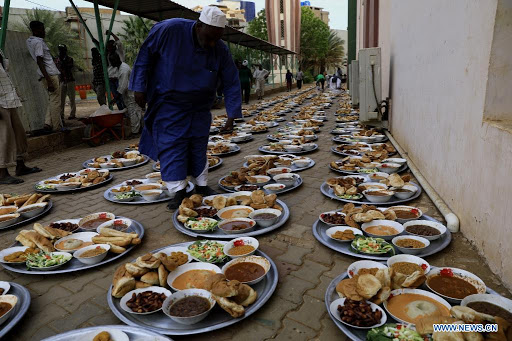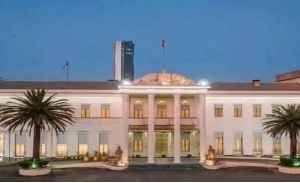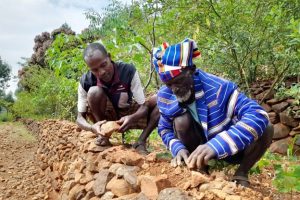
COMPILED BY BETELHEM BEDLU
There is nothing as exhilarating as celebrating religious or cultural festivals that are unique for you and in a manner you have never experienced it before. In fact, for Ethiopians who have a diverse cultural and religious values and celebrating festivals together irrespective of differences, this may not be a surprising incidence. Particularly, with a trend that Christians get together to celebrate Muslims holydays and Muslims gathering to celebrate Christians’ festivals, the celebrations is a usual phenomenon that show their longstanding culture of tolerance, peaceful coexistence, togetherness and solidarity.
The incident, however, for an Egyptian photojournalist, Jonathan Rashad, assigned by UNICEF in Ethiopia some years back, it was a lifelong experience he always visualizes.
After attending the festival, he shared his experience of Ramadan in Harar, one of Islam’s holiest cities. Jonathan took a day out to witness celebrations of the Muslim Holy Month of Ramadan in the ancient city.
It was when he was on the way to Dire Dawa, a city in the Oromia State; he stopped for one day in Harar and witnessed the unique feature of the fiesta.
Speaking about the celebration in Harar, the photo journalist said that the best thing about Ramadan is that it brings families, friends and the people you do not see more often when Ifter (when the fast is broken) and eat together.
“It was a great decision; I fell in love with the city. I was struck by the structure of the old historic wall surrounding the city, the colors of scarf’s and dresses the residents wore, the structure of the mosques and shrines, the tiny alleys of the city and how we were treated – they treated us like family.”
Harar was once an important center of Islamic culture and religion in the Horn of Africa during the late middle Ages. Home to a total of 184 mosques and shrines, Harar is considered the fourth holy city of Islam. Its famous wall was built in the sixteenth century by Emir Nur ibn Mujahid to protect against attack from the neighboring Christian Ethiopian Empire, but today Muslims and Christians share the city in peace.
The other visitor who got the chance to witness the Month of Ramadan in Harar is AbdulSemed Atick.
As to him, the Hararians welcome Ramadan with open heart, compassionate character, spiritual behavior, joyful atmosphere and with lots of generosities. Grandmothers, mothers, sisters, aunts and even neighbors come together for preparing spices, grinding oats and barley for soups and rolling thin bread for sambussa, preparing bajia and Hararian style kebab.
Fathers, sons and kids put lamps at their compound and on poles for light on drive way or for narrow neighborhood street. Most families also hire helpers for cleaning carpets, washing clothes, sweeping the floor and corridor makes everything perfect for the Month of fasting as special occasion for praying and reciting the Holy Book Qur’an, he added.
The smell of Harari traditional Ramadan special dishes during the entire month and sharing with family members and handout portion to the poor cannot be found in any Muslim society but only in Juggul. The kind deeds of feeding the less fortunate are the pillar of its people’s high standard spiritual and moral obligatory practices.
The most amazing behavior of its structural spiritual of society, the kind words and good deeds during the blessed month – everywhere you go, every stranger you meet, the shop you stop by, fruit, produce and vegetable selling ladies, old or young, boys or girls, kids or teenagers, beggars or mentally ill, taxi driver or city workers greet you with absolute respect and expect nothing back except kind words or smiling gesture, AbdulSemed remarked.
Ramadan in Harar is the most spiritual joyful time – in groups reciting Qur’an and all night long Salawatt, feeding poor, giving Zakkat and alms, five times Jammaa pray in all mosques, specially Ishaa-Taraweeh pray and Fridays are the most spiritual commitment of the year. Fridaas Jumaa Salaht especially at Grand Jumma Masjid, prayers come early in-groups reciting Qur’an verses after verses, Suras after Suras and at the end of recitations chanting (La EeLahha EellalAllah-99 times) still continuing throughout the generations.
Reciting with groups or even listening give you the utmost degree of spiritual enlightening pleasure and make you content in your daily life and tremendously increase your Imman. “I have been in a lot of Muslim or non-Muslim countries but like Harar during Ramadan, no genuine place of emotional, spiritual, psychological, physiological attachment and excitement fasting month which I really enjoyed,” he opined.
After fasting fifteen days, then came the most exciting change of delicious diet night, may be the wisdom of ancestors made this night for the safely and peacefully passed half month fasting.
Some families also invite family members, friends and neighbors to join them breaking the fasting at sunset and feed the poor. Khatimat evening and the last Laylatol Qudr nights – Harari households blessed with sincerity, spiritual attitude and with moral behavior spend unconditional submission to God the rest of the nights.
Every house you go the joy of spirit happiness, the profound true smile you receive and the farewell readiness of Ramadan, with plenty of Duaa and ask the Almighty Allah for forgiveness, repentance and atonement, the amazing concept, their greatest wishes to be alive for next Ramadan, AbdulSemed added.
For Harari people, Ramadan is a Month in which they pay their religious duty of Zakat and Fitri, as well as making themselves busy giving more alms, feeding and helping elderly and orphanage families, became obligatory habit on this blessed month.
It is also the time of the year where family members visit tombs reciting Qur’an verses of Surah Yasin and Surah Mulk and making plenty of Duaa for loved ones who deceased. A lot of people go to shrines to make Duaa for those who sacrificed for cause of Allah and Deen as well for the religious scholars and Auliyaa Wa Salihiin.
Most families on this Ramadan occasion invite family members, friends and Qur’an reciters read the whole Holy Qur’an and make Duaa for departed parents, siblings or loved once by feeding (Sadaqa) the invited guests and the poor. It is also the month most families on daily basis jointly, repeatedly reciting Surah Yasin, Surah AlMulk and Ayat Al-Kursi afternoons and nights.
Above all this, Harar is one of the chosen among a thousand of World Heritage Sites. The humbleness of Harari tolerance, where the poor knock the gate at early in the morning to get their daily ration as if food banks, without any hesitation, one after another receive whatever handouts – only happens in Juggul.
In fact Harar is the city with full of generous and generosity, city with miracle, blessings and plenty, a city with more than 99 mosques with 99 shrines. It is also known as one of the holiest cities.
The Ethiopian Herald 23 April 2021





